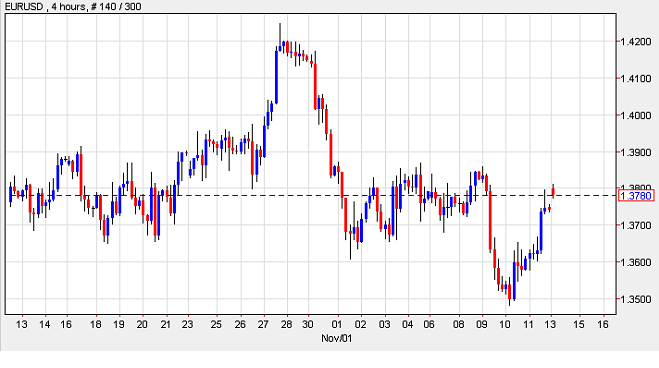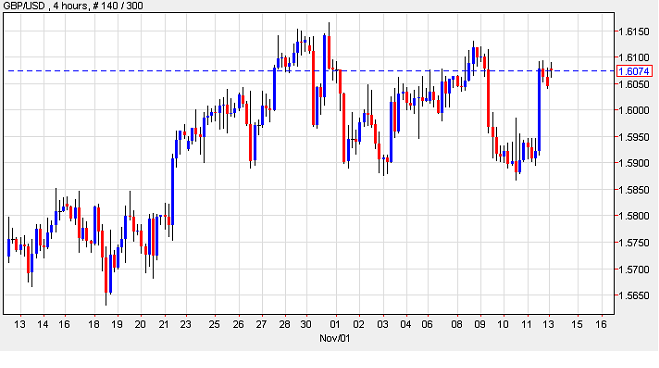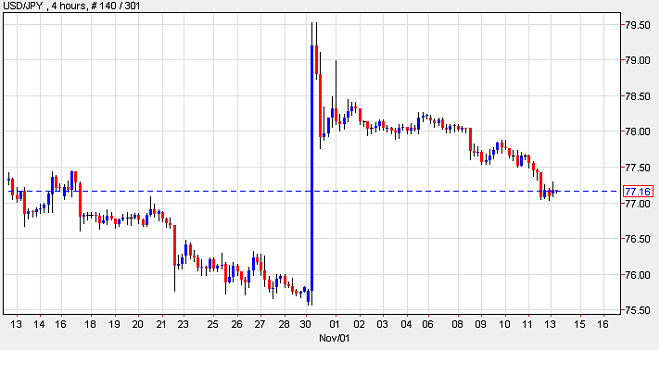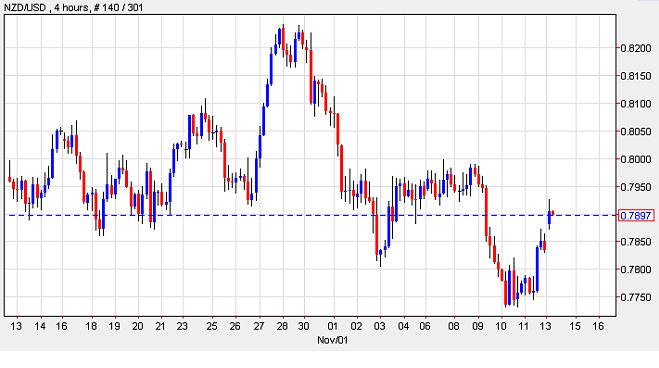Risk sentiment dominated the markets since Friday, as investors were put at ease by signs that E.U. leaders were taking active measures to control the debt situation.
Risk sentiment dominated the markets since Friday, as investors were put at ease by signs that E.U. leaders were taking active measures to control the debt situation. For starters, Italy’s senate passed a bill to implement key austerity measures. Secondly, Greece welcomed their new Prime Minister, Lucas Papademos, who emphasized the importance of obtaining the 6th loan under the bailout plan. In the U.S., better than anticipated economic data boosted the rise of global stocks and commodities, although it failed to make a big impact on the Dollar Index. Metrics revealed that U.S. consumer sentiment increased the most in five months –a factor that also contributed to risk appetite. The University of Michigan Consumer Sentiment Index increased from 60.9 to a seasonally adjusted 64.2. And as the U.S. published better than expected stats, the Canadian Dollar erased prior losses sustained on concerns over the Euro region debt crisis.
The Euro climbed for a third day on speculation that Italy’s soon to be Prime Minister, Mario Monti, would be able to successfully contain the debt crisis. The shared currency rose against the greenback on Friday as Italy’s senate approved new austerity measures. Analysts expect this to be another week of uncertainty as investors wonder whether the European Central Bank will announce a bout of quantitative easing in order to prevent the collapse of the Euro zone. In addition, European banks are expected to get rid of more Italian government debt in an effort to preempt a worsening of the situation while avoiding large write downs. Meanwhile, the Pound slipped versus the Euro amid optimism that European leaders are doing what’s needed to address the debt crisis. The British Pound gained against the U.S. Dollar as the U.K. was deemed a “safe haven.”
Japan’s Yen traded mixed and gained versus the greenback despite last week’s intervention efforts to reduce the value of the currency. Data released on Thursday indicated that Japan’s economy is likely to contract in the fourth quarter.
Lastly, the New Zealand Dollar rose versus most of its peers as government reports pointed to an increase in retail sales by 2.2 percent.
EUR/USD- Italy’s Senate Passes Bill
The Euro increased sharply against the U.S. currency after Italy’s senate approved a bill addressing important austerity reforms. Economists are confident that these new measures will “bring Italy back from the brink” of disaster. Furthermore, the Prime Minister, Silvio Berlusconi, has stated he’ll be stepping down. Investors are optimistic that the new Prime Minister, Mario Monti, has the ability to contain the debt crisis. The 17-nation currency rose against Japan’s Yen as the new Greek Prime Minister, Lucas Papademos, stated that his priority is to make certain Greece receives the 6th loan promised under the bailout plan.
GBP/USD- Improving Political Picture Benefits Pound
The British Pound increased against the U.S. Dollar as risk appetite reigned in the market once again. Investors were set at ease as Italy’s senate voted to approve new austerity measures; and given the importance of Italy as an economic power in the Euro region, the vote was considered a positive move towards solving the debt crisis. The Pound dipped against the Euro given growth concerns, after the European Commission lowered its forecast for the U.K. to just 0.6 percent in 2012; it’s important to note that the British government had issued a forecast of 2.5 percent. On the data front, Producer Prices rose slightly with PPI Core Output revealing a YoY drop to 3.4 percent; PPI Output YoY was 5.7 percent and PPI Input YoY fell to 14.1 percent.
USD/JPY- Economy May Contract In 4Q
The Yen traded mixed on Friday and appreciated against the greenback. A hike in risk appetite following positive news from Italy led to the Yen’s weaker performance versus the Euro and the Pound Sterling. However, fears of further intervention capped some of the currency’s advances versus the U.S. Dollar. On the economic front, reports showed a drastic fall in Machine Orders. The Tertiary Industry Index revealed a drop of -0.7 percent MoM for September. Domestic Corporate Goods Price Index MoM in October slumped by -0.7 percent; and lastly, Loans and Discounts Corp YoY dipped by -0.7 percent. According to analysts, these lackluster figures point to a contraction of the economy for the fourth quarter. Today’s news was a bit more positive, as official figures indicated that GDP reached 1.5 percent in the last quarter.
NZD/USD- Retail Sales Rise
New Zealand’s currency rose against the U.S. Dollar after reports indicated that Retail Sales gained by 2.2 percent in the third quarter. The South Pacific monetary unit advanced versus most of its counterparts after the data showed retail sales went up the most since 2006, more than analysts had anticipated.
Today’s Outlook
Today’s economic calendar shows that the Euro zone will report on Industrial Production. Switzerland will issue data on PPI. In Canada, Central Bank Governor Carney is set to deliver a speech. And Australia will publish the minutes from the last Monetary Policy Meeting.
- English (UK)
- English (India)
- English (Canada)
- English (Australia)
- English (South Africa)
- English (Philippines)
- English (Nigeria)
- Deutsch
- Español (España)
- Español (México)
- Français
- Italiano
- Nederlands
- Português (Portugal)
- Polski
- Português (Brasil)
- Русский
- Türkçe
- العربية
- Ελληνικά
- Svenska
- Suomi
- עברית
- 日本語
- 한국어
- 简体中文
- 繁體中文
- Bahasa Indonesia
- Bahasa Melayu
- ไทย
- Tiếng Việt
- हिंदी
Daily Report: EUR/USD, GBP/USD, USD/JPY and NZD/CAD
Published 11/14/2011, 07:40 AM
Updated 09/16/2019, 09:25 AM
Daily Report: EUR/USD, GBP/USD, USD/JPY and NZD/CAD
Latest comments
Loading next article…
Install Our App
Risk Disclosure: Trading in financial instruments and/or cryptocurrencies involves high risks including the risk of losing some, or all, of your investment amount, and may not be suitable for all investors. Prices of cryptocurrencies are extremely volatile and may be affected by external factors such as financial, regulatory or political events. Trading on margin increases the financial risks.
Before deciding to trade in financial instrument or cryptocurrencies you should be fully informed of the risks and costs associated with trading the financial markets, carefully consider your investment objectives, level of experience, and risk appetite, and seek professional advice where needed.
Fusion Media would like to remind you that the data contained in this website is not necessarily real-time nor accurate. The data and prices on the website are not necessarily provided by any market or exchange, but may be provided by market makers, and so prices may not be accurate and may differ from the actual price at any given market, meaning prices are indicative and not appropriate for trading purposes. Fusion Media and any provider of the data contained in this website will not accept liability for any loss or damage as a result of your trading, or your reliance on the information contained within this website.
It is prohibited to use, store, reproduce, display, modify, transmit or distribute the data contained in this website without the explicit prior written permission of Fusion Media and/or the data provider. All intellectual property rights are reserved by the providers and/or the exchange providing the data contained in this website.
Fusion Media may be compensated by the advertisers that appear on the website, based on your interaction with the advertisements or advertisers.
Before deciding to trade in financial instrument or cryptocurrencies you should be fully informed of the risks and costs associated with trading the financial markets, carefully consider your investment objectives, level of experience, and risk appetite, and seek professional advice where needed.
Fusion Media would like to remind you that the data contained in this website is not necessarily real-time nor accurate. The data and prices on the website are not necessarily provided by any market or exchange, but may be provided by market makers, and so prices may not be accurate and may differ from the actual price at any given market, meaning prices are indicative and not appropriate for trading purposes. Fusion Media and any provider of the data contained in this website will not accept liability for any loss or damage as a result of your trading, or your reliance on the information contained within this website.
It is prohibited to use, store, reproduce, display, modify, transmit or distribute the data contained in this website without the explicit prior written permission of Fusion Media and/or the data provider. All intellectual property rights are reserved by the providers and/or the exchange providing the data contained in this website.
Fusion Media may be compensated by the advertisers that appear on the website, based on your interaction with the advertisements or advertisers.
© 2007-2025 - Fusion Media Limited. All Rights Reserved.
